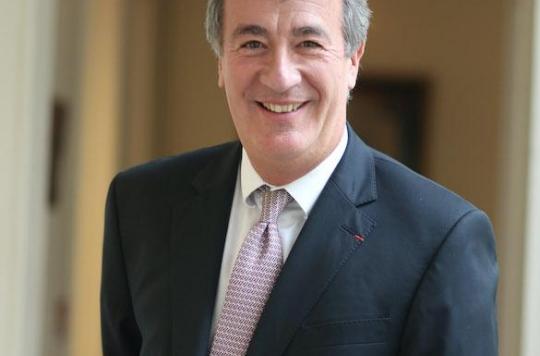The number of people infected with Covid-19 continues to increase. To help hospitals, some intensive care units of which are already saturated, general practitioners are at the heart of the system. Philippe Boutin, general practitioner in Poitiers, tells how he is organizing himself in this unprecedented context.

- Everything is organized in the practice to avoid contact
- Sharp increase in the number of teleconsultations
- The need to reassure
General practitioners are at the heart of the care system for potentially infected patients. They are on the front line to guide potential infected patients on the steps to follow, while ensuring that they and the patients are protected. Philippe Boutin, general practitioner in Poitiers, details his daily life against the virus.
How do you organize yourself in the face of the wave of coronavirus?
I work in a large structure that brings together 35 professionals, so you have to be able to coordinate. The first thing is the protection of personnel. This involves the use of hydroalcoholic solutions, gowns, masks, protective plexiglass to avoid contact. For patients, we also provide hydroalcoholic gel, waiting is done outside the structure and authorization to enter is done one by one. Waiting rooms are regularly disinfected, as are patient seats, examination tables and desks. As soon as there is a doubt of Covid-19 infection in a patient, he must imperatively wear a mask. We have also started teleconsultations to reduce the physical presence of patients.
Which patients visit you?
Life goes on. We have patients who come to renew their treatment, there are also paediatrics. On the other hand, where there is concern, it is about infectious problems, asthma and diabetes. This represents between 1/5th and 1/4th of patients but at the peak of the epidemic, this should concern one in two people, or even more.
What instructions have you received from health authorities to deal with the coronavirus wave?
They are constantly evolving and not always easy to integrate. The information is not always cross-checked between the different authorities. It lacks fluidity, help with certain things. However, we are only at the beginning, we will improve. The major choice schemes are now well fixed and, on this, the information agrees. For the rest, we learn on the job.
What role does teleconsultation play in avoiding the risk of infection?
For the moment, the figures remain modest. In 3 days, I made about ten. It corresponds to a request, people prefer to avoid travel. In my opinion, the number will increase in the coming days. I already see a lot of patients who have changed their appointment to make it a teleconsultation. Before the arrival of the coronavirus, we did not do it even if we considered it. The request is recent, here we are on a war medicine. The Head of State said so and it is. We go to the essential. Usually, the auscultation time is always increased to support the diagnosis. Now, we are going to the most urgent and it fits well with the spirit of teleconsultation.
How do you respond to patients who fear being infected?
Currently we are in phase 3 of the epidemic, which means that the virus is circulating. When a patient comes to see us with fever and breathing difficulties without taking the test, there is enough doubt to suspect Covid-19. We say it frankly and we play it down: 80% of cases go very well, 10 to 15% a little less well and 2% not well at all. In the vast majority of cases, the settlement will be quite simple within 15 days. If the tests had been done directly, the numbers would not have risen so quickly. These statistics need to be given meaning in due proportion.
.















